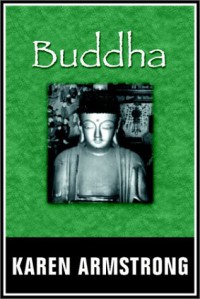 Twenty-five years ago or so I read Gore Vidal's Creation and my perception of the Buddha has been fatefully tainted ever since. Cyrus Spitama, the novel's protagonist and the grandson of Zoroaster, finds himself in India at one point and has an opportunity to meet Gautama:
Twenty-five years ago or so I read Gore Vidal's Creation and my perception of the Buddha has been fatefully tainted ever since. Cyrus Spitama, the novel's protagonist and the grandson of Zoroaster, finds himself in India at one point and has an opportunity to meet Gautama:We followed Sariputra up the steps and into the hut, where all of those who had been seated rose to greet us except for the Buddha, who remained seated on his mat. I could see why he was called the golden one. He was as yellow as any native of Cathay. Not only was he not Aryan, he was not Dravidian either. Obviously, some tribe from Cathay had crossed the Himalayas to sire the Gotama clan.
The Buddha was small, slender, supple. He sat very straight, legs crossed beneath him. The slanted eyes were so narrow that one could not tell if they were open or shut. Someone described the Buddha's eyes as being as luminous as the night sky in summer. I would not know. I never actually saw them. Pale arched eyebrows grew together in such a way that there was a tuft of hair at the juncture. In India this is considered a mark of divinity.
The old man's flesh was wrinkled but glowing with good health, and the bare skull shone like yellow alabaster. There was a scent of sandalwood about him that struck me as less than ascetic. During the time I was with him, he seldom moved either his head or his body. Occasionally he would gesture with the right hand. The Buddha's voice was low and agreeable, and seemed to cost him no breath. In fact, in some mysterious way, he seemed not to breathe at all. (pp. 294-5 in my edition)
In the novel, Cyrus is a stand-in for the Westerner who is constantly questioning the things of the material world and trying to find reasons for our existence. For anyone familiar with Buddhism, it should come as no surprise that he was sorely disappointed in its founder's philosophy, for the material world is an illusion, and the goal of those striving for enlightenment is the utter extinguishment of the self.
I'm reminded of Creation because Karen Armstrong reminds me of Cyrus Spitama. She isn't asking the same questions but she is writing about the life and times of a man who would have argued that her endeavor is pointless. The man Siddhartha Gautama is irrelevant; the dharma he taught should be the focus.
Happily, though, Armstrong manages to follow a "middle way" - She puts together all the facts and speculation about when and where the Buddha lived and taught and a clear explication of early Buddhist practice and belief (the "important" stuff).
Unfortunately for specifics, I listened to the book (well read by Kate Reading - now there's an appropriate name) driving to and from work so my ability to take my accustomed notes for books like this was...ahem...limited (I am not of that generation who believes they can text and drive simultaneously). But Armstrong does a good job of showing how Gautama - who came from outside the Brahmanic system - first renounced his noble lifestyle and then spent several years trying to find a dharma that made sense of the world. The solution he arrived at rejected Brahmanic ritual (and its attendant Hindu caste system) and extreme ascetism (which only the hopelessly committed could ever hope to attain) for a way of life that didn't demand more than a person was capable of at any particular point in life, and that was (potentially) open to all - from the haughtiest Brahmin to the lowest Dalit. Importantly, the Buddha claimed that the pudding's proof was that anyone who followed his dharma enjoyed a more peaceful, settled, less anxious life.
Buddha can be read as an adjunct to Armstrong's work on the Axial Age, The Great Transformation: The Beginning of Our Religious Traditions. This was the era when the foundations of the world's great religious traditions were laid down by a series of brilliant innovators who arose in response to the increasing violence and atomistic urbanization of the Ancient world: The Greek philosophers, the Hebrew prophets, Zoroaster, the Hindu authors of the Upanishads, Mahavira (Jains), and Laozi & Confucius in China. She puts the Buddha into this context and argues that the religion's popularity was enhanced by its ability to address people's anxieties and the place it made for the rising classes who existed outside of the traditional Vedic system (brahmins, kshatriyas, vaishyas, shudras).
It's also helpful that I'm reading (actually "reading") Wendy Doniger's new history of Hinduism as she goes into great depth about the Hindu response to the new age of urban civilization and puts the rise of Buddhism into a fuller context.
Whether read or heard, I would recommend Buddha as a lucid introduction to both man and philosophy.


